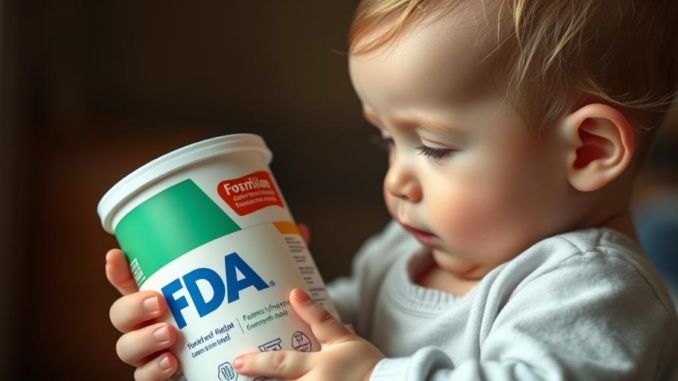
Summary
This article summarizes FDA guidelines for safe infant formula handling, emphasizing preparation, safe water usage, and avoiding homemade formulas. It highlights potential risks of improper handling and directs readers to official resources for further information. The FDA’s recommendations prioritize infant health and well-being by ensuring safe and nutritious feeding practices.
** Main Story**
Okay, so let’s talk about something super important: keeping our little ones safe when it comes to formula. We all know how crucial it is to get this right; I mean, their health and development are literally in our hands.
The FDA has some really solid advice, and honestly, following it is a no-brainer. So here’s the lowdown.
-
First and foremost: ditch the DIY formula. Seriously, just don’t do it. I know, some people think they can whip up something “natural” or whatever, but it’s just not worth the risk. These homemade concoctions can lack essential nutrients, plus, they’re a breeding ground for nasty bacteria. Remember, commercially made formula is rigorously tested and regulated. Trust the process. It’s there for a reason.
-
Second, water matters. Always use water from a safe source when you’re mixing up that powdered formula. Tap water’s generally fine, but hey, if you’re even slightly unsure, just grab some bottled water, better safe than sorry, right? And, a little something extra, if you’ve got a preemie, a baby under three months, or one with a not-so-great immune system, chat with your pediatrician, you know, just to be doubly sure you’re doing everything by the book.
-
Third: hygiene, hygiene, hygiene! Before you even think about touching that formula, scrub those hands, good. At least 20 seconds with soap and water. And make sure those bottles, nipples, and any other feeding gear are squeaky clean. Sterilizing them initially is a great idea – a five-minute boil works wonders, and if you’re using a dishwasher, use the heated drying cycle or the sanitizing setting. Also, those formula containers? Yeah, the outside needs a wipe down with a disinfectant wipe, but don’t go cleaning inside the container. And if the scoop has a little accident and falls onto a dirty surface? Treat it like a dirty bottle. Makes sense?
A little bit more to help you handle formula safely
-
Now, let’s talk about heating and storage. Microwaves? Hard pass when it comes to formula. They create these crazy hot spots that could burn your baby. Instead, warm the bottle in a pan of warm water or run it under warm tap water. Once you’ve prepped the formula, refrigerate it pronto and use it within 24 hours. And hey, after feeding time, chuck any leftovers. Freezing? Wouldn’t recommend it. It can make the formula separate, and it just becomes kinda gross. Oh, and I can’t stress this enough, never feed formula that has been sat in the fridge for longer than the guidelines suggest. I know it seems like a waste, but your little ones health is much more important. I had a friend do this once, and her baby was sick for days.
-
One last thing: that ‘use by’ date is not a suggestion! Always check it. Once it’s passed, the manufacturer can’t guarantee the nutrient content or, honestly, the quality of the formula. You don’t want to risk feeding your baby something that might not be good for them.
The FDA’s Got Your Back
The FDA’s not just sitting around twiddling their thumbs. They’re actually working hard to make sure the formula on shelves is safe. They’re overseeing manufacturers, enforcing strict rules about what goes into the formula, how it’s labeled, and how it’s made. It’s good to know there’s someone out there making sure all this is being taken care of.
Want more info? Hit up the FDA website or other legit sources. Keeping yourself informed is one of the best things you can do for your little one’s health. It sounds a bit cliché, but knowledge really is power. And when it comes to your baby, you want all the power you can get to make the best choices for them. Because, well, they deserve it, don’t they? So, lets work together and keep our babies safe.


DIY formula, eh? So, if I grind up some kale and add sunshine, is that considered “artisanal” or just a biohazard? Asking for a friend… who’s a doll, not a baby. Definitely a doll.
Haha, love the artisanal biohazard concept! While kale and sunshine might be great for dolls, babies need specific nutrients. The FDA guidelines are there to ensure they get exactly what they need for healthy growth. Let’s leave the DIY experiments for playtime and stick to tested formulas for our little ones!
Editor: MedTechNews.Uk
Thank you to our Sponsor Esdebe